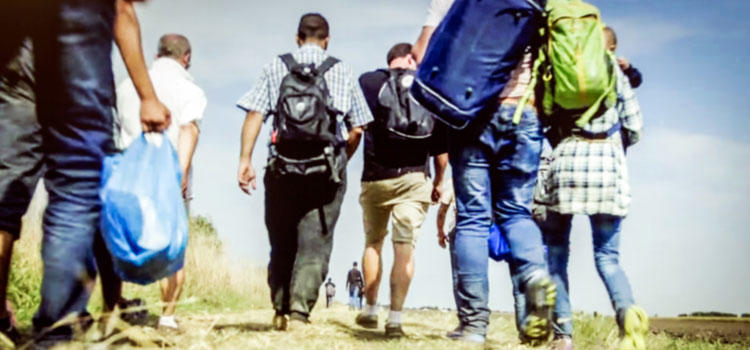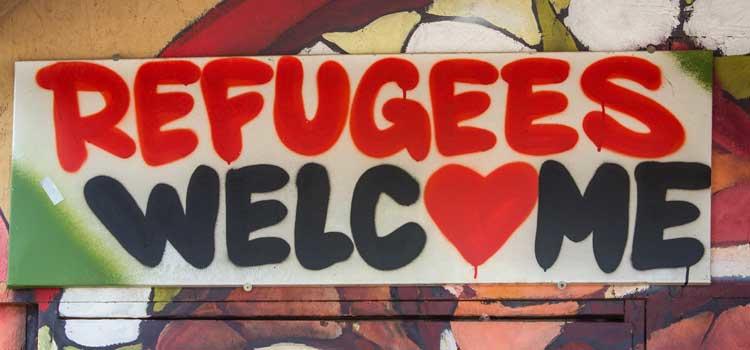
The world is facing the largest refugee crisis since World War II.
Nov. 17, 2016
Dr. Gabriel Fabreau, MD. knows what it’s like to be the kid with the weird food and funny accent. Fabreau's parents were among a wave of United Nations refugees fleeing a military dictatorship in Uruguay. His family was settled by the Canadian government in Medicine Hat in the late 1970s.
Compared to the multicultural, Latin American society of Uruguay’s capital, Montevideo, the small Alberta city was a decidedly “socially conservative” place four decades ago, he says. “You’re a kid in elementary school and you sound different,” says Fabreau, who is now a clinical assistant professor at the Cumming School of Medicine.
“Your parents have accents, your skin’s a little different than other people’s, and you have weird lunches. It was not easy. That experience probably fuels a lot of my indignation when I see health inequality now for people of different ethnicity, sexual orientation, immigration or political status.”
The Conversation: Closing the immigrant wage gap: Is speaking English important?
Fabreau is among researchers at the University of Calgary who are helping refugees, at a time when countries across the globe are grappling with the largest refugee crisis since the Second World War.

The world is facing the largest refugee crisis since World War II.
According to the UN Refugee Agency, there were 65.3 million forcefully displaced people as of the end of 2015, of which 21.3 million were refugees, fleeing wars in countries such as Syria, Afghanistan, Eritrea and Sudan. Concerns about immigration and re-settlement were not only a factor in the recent decision by British voters to leave the European Union, the issue has also dominated the current U.S. presidential election campaign.
The issue was brought home to Canadians during the federal election campaign in 2015 by the drowning of three-year-old Syrian refugee Alan Kurdi off a Turkish beach. His family was trying to escape to Greece in a bid to be reunited with relatives in Canada.
An internal medicine physician who helps treat patients at the Mosaic Refugee Health Clinic in Calgary, Fabreau is also a researcher at the O’Brien Institute for Public Health. He started to help gather data in 2014 on the clinic’s patients following a federal government decision in 2012 to cut refugee health care benefits.
"We see people come in terrible shape out of refugee camps."
The cuts resulted in patients not seeking care until they were so sick that they were forced to go to hospitals, costing the system more money while putting refugees at risk, says Fabreau. The Federal Court ruled that the policy amounted to cruel and unusual treatment.
“Pregnant women in our clinic were telling us that they were being turned away from care, or were being asked for credit cards at the hospital. We saw a lot of bad health outcomes.”
Related: Refugee shelter design gains international recognition
The health care benefits were restored in 2016. As principal investigator, Fabreau’s research centres on about 2,200 refugees treated at the Mosaic Refugee Health Clinic from 2011 to 2016.
“We built a very comprehensive set of data that will allow us to answer a lot of questions,” he says. He is working on combining data from the clinic with efforts by Harvard University and Massachusetts General Hospital to study refugees in the Boston area. “One of the exciting things is that we are going to start to do collaborative work across the two sites.”
Fabreau wants to understand “the needs of the different refugees from various parts of the world — because those from Eritrea are certainly different from those from Bhutan or Syria — and what is the quality of care we currently deliver, and how can we better improve its efficiency and quality to tailor it to these different patients.”
Refugees pose a unique set of challenges for the Canadian health care system, says Fabreau. They have often endured traumatic events ranging from wars, torture and imprisonment to societal breakdown in their home countries, leaving behind the support of family and friends when they immigrate.
Many also lacked access to health care and suffered other deprivations, such as poor nutrition. Fabreau says this can result in pre-existing chronic conditions such hypertension, anemia, chronic lung disease and diabetes when they arrive in Canada, sometimes leading to poor health outcomes. “Time and time again, we see people come in terrible shape out of refugee camps with a lot of neglected health issues, and a ton of post-traumatic stress disorder and other things.”
A common mistake of private sponsors of refugees is to take them to their own family doctors, who often lack experience with things like tropical diseases or parasites not found in Canada, says Fabreau. By contrast, the Mosaic Refugee Health Clinic has the expertise needed to help such patients, he says. “When they leave our clinic, they are often employed, they can speak English, they have their health issues under control and they integrate very well.”
The ability of refugees to rebuild their lives fascinates associate professor Dr. Julie Drolet, PhD, of the Faculty of Social Work. “One of the things that we are interested in is looking to see how people are resilient to begin with, and how to build, develop and foster that resiliency in light of the challenges or traumatic experiences they may have witnessed or gone through,” she says.
“People are going to be seeking new livelihoods because their former ones were devastated."
Drolet recently led a four-year study, ending in 2016, called Rebuilding Lives Post-Disaster: Innovative Community Practices for Sustainable Development. Researchers from Australia, Canada, India, the U.S., Pakistan and Taiwan looked at the impact of everything from wildfires to hurricanes and flooding.
“People are going to be seeking new livelihoods because their former ones were devastated by disasters or the impact of climate change, which are happening with greater intensity and more frequency,” says Drolet. “I think with what are seeing in the environment today, we are going to continue to see an increase in the number of migrants around the world.”
Drolet says there needs to be a change in focus so that resiliency is built into communities, reducing the need for people to permanently leave their homes. “A lot of resources go into short-term emergency response, but we need to think how we can better support communities in long-term recovery efforts,” she says.
“We are starting to see an increased role for social service agencies and community organizations who were there before the disaster. They continue to play a really important role post-disaster.”
Better understanding how children and youths are affected by disasters is part of the three-year Alberta Resilient Communities Project, which was launched in 2015. Funded by Alberta Innovates: Health Solutions, the study is looking at the southern Alberta floods of 2013.
“There have been a lot of lessons learned from the floods, so we are trying to document those,” says Drolet, who is collaborating with Caroline McDonald-Harker of Mount Royal University and Robin Cox of Royal Roads University.
Drolet’s interest in helping people get back on their feet goes beyond her research. Along with other professors at the Faculty of Social Work's Edmonton campus — Anne-Marie McLaughlin, Linda Kreitzer, Rick Enns and Janki Shankar — she signed a partnership agreement with the Mennonite Central Committee in Calgary to privately sponsor a family of Syrian refugees, who will be located in Edmonton.

Canada has opened its borders to tens of thousands of Syrian refugees.
“We’ve now fundraised over $26,000 and we are looking to raise a total of $30,000 that will cover the needs of a family of five for 12 months,” says Drolet. “We are waiting to be matched with a Syrian family and, hopefully, that will happen in the next couple of months.”
While the sponsorship is simply a humanitarian initiative and not part of any research, Drolet may tie it to a class she is teaching called Social Work Practice with Immigrants and Refugees. “I think it presents an opportunity for students to learn more about immigration issues.”
These include ensuring refugees are able to find “decent work,” she says. “There are some studies that have shown that access to employment can facilitate other settlement outcomes, like being able to access good housing and being able to feel connected – to have a sense of belonging in Canada.”
Compared to countries such as France, Canada has a different orientation toward immigrants and refugees, she says. “We consider it a ‘two-way’ integration. We believe that newcomers need to adapt to Canadian society, but as Canadians, we also need to adapt and be welcoming and inclusive to the newcomers who are arriving.”
"Refugee migration is going to become one of the key issues of our time."
As a nation largely built by immigrants and refugees, Canada has gained much expertise in helping such people, including a strong settlement sector that ranges from government agencies to ethno-cultural associations, says Drolet. “I think there is a lot of knowledge that can be shared with the world.”
However, Canada also needs to keep abreast of changes as circumstances and policies evolve, she says. “A lot of newcomers still settle in the three largest cities in Canada – such as Toronto or Montreal – but we are also seeing newcomers settle in smaller communities, and that’s particularly important for us to consider here in Alberta.”
Along with University of Lethbridge professor Glenda Bonifacio, Drolet is the editor of a book called Canadian Perspectives on Immigration in Small Cities. A collection of different research studies, the book is slated to be published in 2017.
Drolet is also a co-investigator in a Canada-wide research initiative called Pathways to Prosperity. It is an alliance of government, university and community partners that promotes the integration of immigrants and minorities.
“A lot of shifts are taking place – a lot of changes that are leading to political changes – and we need to understand what this means,” says Drolet. “I think refugee migration is going to become one of the key issues of our time and we’re going to need to continue to learn about how to best manage it.”
– – – – –
Participate in a research study
– – – – –
Dr. Gabriel Fabreau is a clinical assistant professor at UCalgary's Cumming School of Medicine. He is also an internal medicine physician who helps treat patients at the Mosaic Refugee Health Clinic in Calgary, and a researcher at the O’Brien Institute for Public Health. His research centres on about 2,200 refugees treated at the Mosaic Refugee Health Clinic from 2011 to 2016. Check out Dr. Fabreau's profile
Dr. Julie Drolet is an associate professor in the Faculty of Social Work's Central and Northern Alberta Region campus in Edmonton. She is principal investigator of the Alberta Resilient Communities Project: Engaging Children and Youth in Community Resilience Post-Flood in Southern Alberta, funded by Alberta Innovates Health Solutions (2015-18) and Rebuilding Lives Post-Disaster: Innovative Community Practices for Sustainable Development, funded by a SSHRC partnership development grant (2012-16). She is co-investigator in Pathways to Prosperity, a research alliance dedicated to fostering welcoming communities that promote the economic, social and civic integration of migrants and minorities in Canada. View Julie Drolet's publications